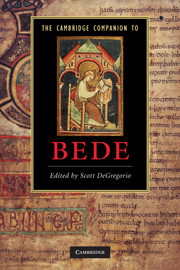9 - Bede and the Old Testament
from Part II - Bede's Writings
Published online by Cambridge University Press: 28 January 2011
Summary
Bede was the greatest biblical scholar of his age. Over forty works, all bound up in some way with understanding Christian Scripture, fill the catalogue at the end of the Ecclesiastical History (V. 24). But it is not merely that Bede was a prolific writer. It is also that his hermeneutic engagement with the Bible was so varied. Throughout his lifelong attempt to grasp its sacred meanings, he inhabited many authorial roles. As other chapters in this volume emphasize, he was a textual critic and linguist, a preacher and liturgist, a geographer and computist, an educator, a poet and a hagiographer in addition to being an exegete and a historian, the two roles for which he is best known today. It is common to contrast Bede's fame as historian, which began in the twelfth century (see Chapter 16), with his renown as exegete, which began in his own lifetime and continued for centuries thereafter. But equally germane is the contrast between the accessibility of the Ecclesiastical History, long available in translation and easy enough to comprehend, and the inaccessibility of the biblical commentaries, which hide in costly Latin editions, and whose theological content presents real interpretive challenges. Compared to the Ecclesiastical History, with its array of colourful personages and engaging narrative pace, the commentaries are bound to appear esoteric and isolated from the social world of their author.
- Type
- Chapter
- Information
- The Cambridge Companion to Bede , pp. 127 - 141Publisher: Cambridge University PressPrint publication year: 2010
- 1
- Cited by



